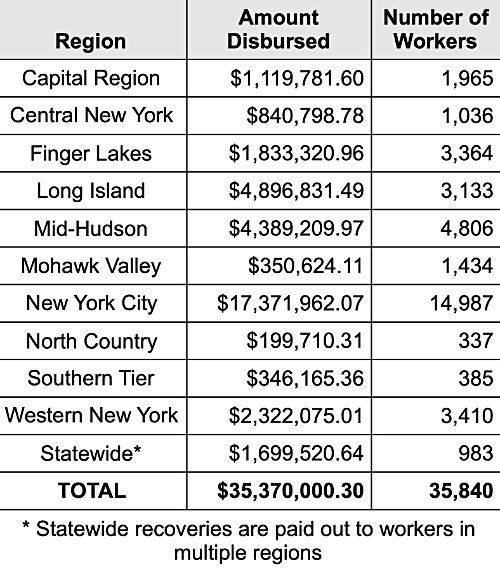- By New York State Governor's Office
- Business & Technology
 Print
Print
Governor Andrew M. Cuomo Wednesday announced more than $35 million was returned to over 35,000 victims of wage theft in 2018 - continuing the state Department of Labor's efforts to stand up for workers being denied wages. Since the Governor took office, the State has recovered and returned over $285 million to more than 250,000 workers - the highest total in the nation.
"New York State will not tolerate theft of wages in any form, and any employer that attempts to unlawfully withhold wages from their hardworking employees will be held responsible," Governor Cuomo said. "We are proud to have recovered and returned the highest amount of denied wages in the country, and we will continue to protect the hard earned wages of men and women throughout the state."
The following table provides a regional breakdown of the $35,370,000 distributed to 35,840 victims of wage theft and prevailing wage underpayments in 2018:

Some of the most common ways employers steal wages include:
State Labor Commissioner Roberta Reardon said, "We will continue aggressively pursuing justice for workers who have been denied their proper wages or have been cheated by employers in the form of improper uniform deductions and other labor violations. Workers deserve an honest wage for an honest day's work and we're here to ensure they get that."
Prevailing wage is the minimum pay rate set by law for employment on public work projects. This applies to all laborers, workers or mechanics employed under a public work contract. The New York State Department of Labor's Bureau of Public Work is responsible for enforcing the law and determining the wage schedule for each individual region. Employers must pay the prevailing wage rate set for the locality where the work is performed. Should a violation of the prevailing wage law occur, the Department of Labor has the authority to ban individuals or businesses from bidding on public work projects for a period of up to five years.
v15i1
"New York State will not tolerate theft of wages in any form, and any employer that attempts to unlawfully withhold wages from their hardworking employees will be held responsible," Governor Cuomo said. "We are proud to have recovered and returned the highest amount of denied wages in the country, and we will continue to protect the hard earned wages of men and women throughout the state."
The following table provides a regional breakdown of the $35,370,000 distributed to 35,840 victims of wage theft and prevailing wage underpayments in 2018:

Some of the most common ways employers steal wages include:
- Paying tips only;
- Paying a day rate for work performed that is sub-minimum wage when hours worked are counted;
- Not paying an overtime rate for hours worked over 40 in a payroll week;
- Not paying for travel time between work assignments in the same day;
- Withholding final paychecks;
- Not paying for "training" time; and
- Charging employees for required uniforms or equipment.
State Labor Commissioner Roberta Reardon said, "We will continue aggressively pursuing justice for workers who have been denied their proper wages or have been cheated by employers in the form of improper uniform deductions and other labor violations. Workers deserve an honest wage for an honest day's work and we're here to ensure they get that."
Prevailing wage is the minimum pay rate set by law for employment on public work projects. This applies to all laborers, workers or mechanics employed under a public work contract. The New York State Department of Labor's Bureau of Public Work is responsible for enforcing the law and determining the wage schedule for each individual region. Employers must pay the prevailing wage rate set for the locality where the work is performed. Should a violation of the prevailing wage law occur, the Department of Labor has the authority to ban individuals or businesses from bidding on public work projects for a period of up to five years.
v15i1




